

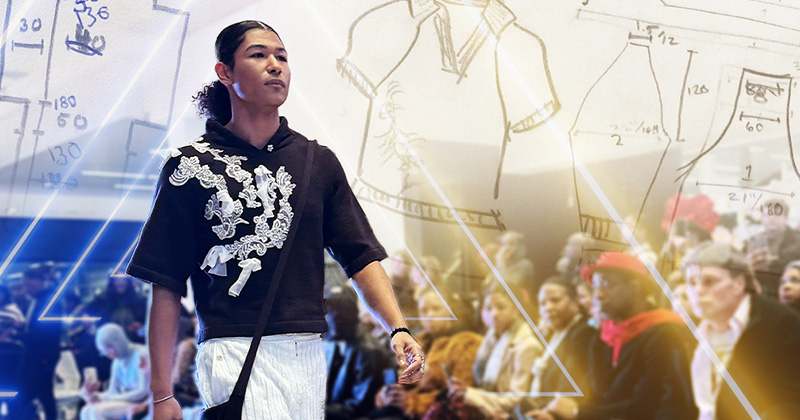
Creating sustainable and inclusive fashion
Photos courtesy of Casey Tyler | Photo illustration by Jaynell Keely April 12, 2024
UD undergraduate student’s designs shown during Philly Fashion Week
As a high school student at Wilmington Friends School, Casey Tyler was so passionate about STEM (science, technology, engineering and math) classes that they entered the University of Delaware as an honors biomedical engineering major.
With a lifelong interest in design in addition to STEM, Tyler thought they would design prosthetics — until a fashion history class taught them that “fashion could be a profession.” STEM soon took second place.
“I thought, ‘Wow. I enjoy this fashion class so much I even enjoy learning about it on my own time,’” said Tyler, who uses they/them pronouns.
Tyler’s passion for fashion recently led to one of their designs being shown on the runway in the student Next Up Designer Showcase at Philly Fashion Week in late February.
The student designers chosen for the show had 30 days to make an outfit to showcase on the runway during the week. Tyler found materials at FabScrap in Philadelphia — which sells pre-sold fabrics that companies have bought but don’t use because of a defect or some other reason — and worked with a model and volunteered during the event.
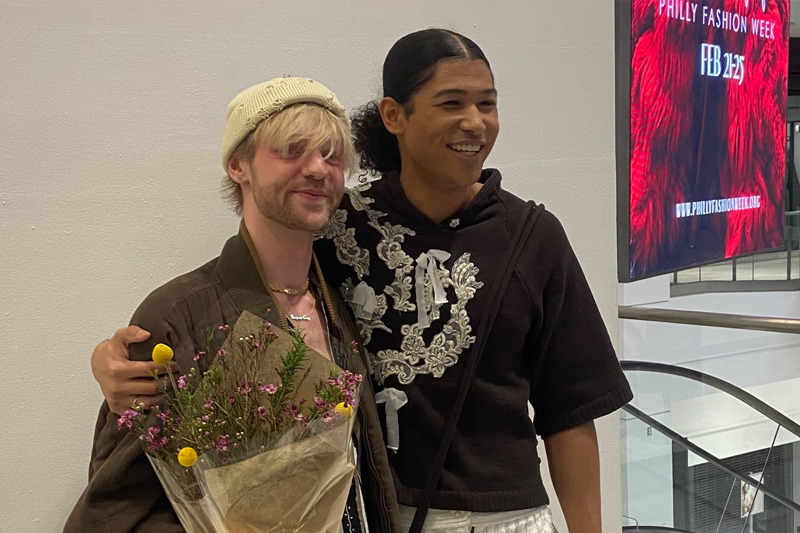
For the show, Tyler created a knit top with hand-sewn floral appliques, sewed slacks with slits in front and back from knee to ankle, and knitted a handbag.
“Even though I didn’t win, I had a great time and made excellent connections for the future,” Tyler said. “My biggest takeaway was learning what it takes to get a design on the runway.
“As designers, we all have this idea that we’re going to make our own brand and have our stuff on the runway — that it will be simple, fun and easy,” they added with a laugh. “Just getting this piece on the runway was an adventure. Doing the volunteer work and seeing designers with full collections on the runway deepened my appreciation for the amount of work that goes into a collection of 13 or 14 outfits and the research and process behind it all.”
The past informs the future
Tyler became a fashion design and product innovation major in the middle of their sophomore year, quickly taking every possible class and following every opportunity. The senior is now preparing to apply for a graduate program at UD after graduating in December 2024.
“My early STEM classes informed some of what I’m doing now,” Tyler said. “Having that background makes me more confident about the grad programs I’m looking at, which are all research-based and more STEM-oriented.”
Born and raised in Newark, Tyler was familiar with UD and its excellent programs; their sister is an alumna. Tyler feels lucky to have been accepted into the STEM honors program and that the University offers a fashion design program.
“The engineering program is wonderful, and the fashion design program is, too,” they said. “I love the whole faculty. My professors have been amazing.”
Creating sustainable and inclusive designs
Tyler is committed to sustainable design, which, for them, comes down to cutting out waste in the design and creation processes. In addition to shopping at FabScrap, they look for other ways to find used materials.
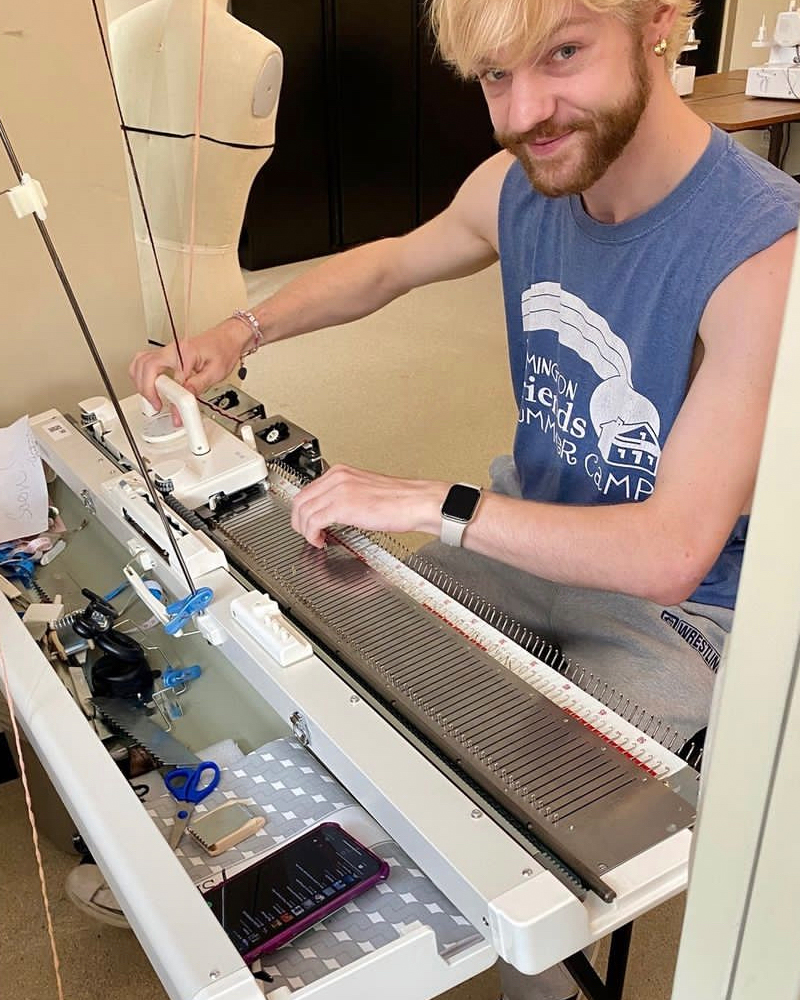
“I also will get a sheet or curtain from Goodwill, for example, and make my first draft design of a garment out of that instead of muslin, which is normally used for a first draft,” Tyler said.
Tyler explained that muslin has a certain rigidity and weight, but finding a sheet or other used material that more closely matches the weight of the desired (finished) garment cuts down on cost as well as meets their desire for sustainability. Although Tyler doesn’t use consignment shops, they do unravel sweaters, rewrapping the yarn to use in other projects.
When designing clothing, Tyler, who identifies as non-binary, said they try to make clothes that “are out of the realm of gender and don’t sit in any specific category.”
“Finding an aesthetic that brings me to this place has taken some self-exploration,” Tyler said. “We are taught to design for dress forms in class, for example, which is not what I want to do for the brand I want someday.”
Tyler explained that they always make clothes that fit themself since they are average height and lean.
“I like to play with the body silhouette and hide or change the body’s curves, so it looks more androgynous,” they said. “There are different philosophies, and we can play with a mix of masculine and feminine and use a third that doesn’t connect with either one, which is what I try to do.”
Color from nature
Tyler has been creating their own colors lately — bright yellow from turmeric, purple from blueberries, red from cherries and various shades of earth tones thanks to coffee beans, tea and acorns. They learned about natural dyes with Adrianna Gorea, assistant professor of fashion and apparel studies, during a Summer Scholars program in 2023.
“Casey came to me, interested in learning more about recycling and upcycling clothing and about knitting, specifically using the Silver Reed flatbed knitting machine,” Gorea said. “Casey was in the lab all summer and sent me progress pictures all the time. This [project] caught their imagination and ignited a passion.”
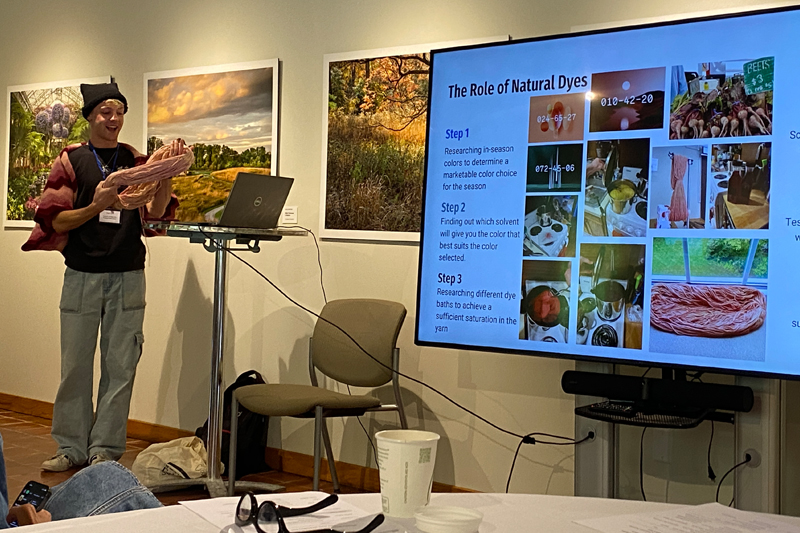
Tyler’s current project is interdisciplinary, combining electrical and textile work by embedding sensors in machine-knitted garments — initially, they are working with gloves — to monitor wrist movement for patients recovering from movement-impairing injuries, such as strokes. Tyler suggested experimenting with natural dyes and natural yarns of different weights and materials.
“The passion and outreach was there, and especially the curiosity about technology and how things work,” Gorea said. “That’s what research is, and Casey is all about that. The follow-through is there, the output is amazing and their path and process is unique.”
Designing the senior collection
Katya Roelse, associate instructor of fashion and apparel studies, agreed. Tyler, who said Roelse connected them with Philly Fashion Week and helped define themself as a designer and future brand, took several courses with her, including illustration, pattern making and the senior capstone course. In those classes, there is always more to teach than time in which to do that.
“But when I mentioned something like flower-making technique in class, Casey always wanted to know more; they are curious and passionate,” she said. “Hopefully, I’ve been able to enhance and push the idea of what fashion can be. They are always asking questions and answering them, always pushing for more and never settling for ‘just the assignment.’”
In Roelse’s senior capstone course, students research industry trends and design techniques and create three looks they present at the end of the semester and submit to the UD fashion show. Tyler used turmeric to dye the dress they designed — their first ever — for their senior collection.
“Casey’s interest in sustainability and inclusivity is powerful and something needed in the fashion industry now,” Roelse said. “Casey has a powerful set of skills and experiences as well as foundational design skills, and creates fun and beautiful fashion, which is why we love it so much.”
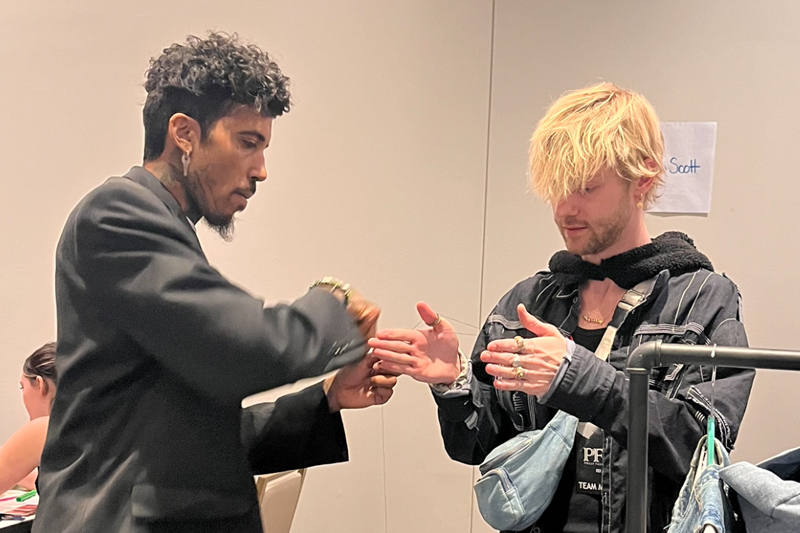
Contact Us
Have a UDaily story idea?
Contact us at ocm@udel.edu
Members of the press
Contact us at 302-831-NEWS or visit the Media Relations website

